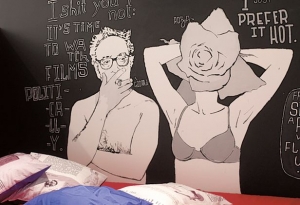What is to be done ? art/film/politics
Centre Pompidou | Palais de Tokyo | Beaux-Arts de Paris
Labos d'Aubervilliers | Espace Khiasma | Maison Pop | Cinéma le Méliès
From the 11th to the 19th of December 2010, the curatorial platform, le peuple qui manque, in association with the Film department of the Centre Pompidou, proposes a series of encounters entitled "Que faire? What is to be done? art/film/politics". These encounters offer an overview of the new critical strategies currently emerging within the international artistic field, and principally within contemporary film production, with a focus on the relationship between art and politics.
During the Winter years, as Félix Guattari called them, the corollary to the fall of the Berlin wall was presumed to be the fading of twentieth-century utopias. It was seen as the pronouncement of the end of history and the death of avant-gardes. However, twenty years later, the current revival of the links between art and politics must be taken into account. Que faire? What is to be done? Jean-Luc Godard asked in his 39-point manifesto and his answer was "we must make films politically". Since the mid-1990s, critical, social and political theories have been revisited, questioned and considerably enriched by new approaches, which are now polyphonic. Simultaneously, these new critical theories have become precious tools of interpretation for thinking about contemporary art, and with the recent upsurge of exhibitions and biennials, many curatorial practices have reformulated critical perspectives relating to history, capitalism, image production, representation and subjectivities. Thus, artists, theorists, curators and activists are collaboratively and cross-sectorially developing the revival of a contemporary form of political art. These encounters consist of a critical symposium, artists' presentations and video projections, and will host artists, film-makers, theorists and curators. The video and film program will present a selection of works on the borders of the art film and the documentary; thus constituting an overview of what making films politically might mean today.
The event will take place over two weekends, on December the 11th and 12th and on December the 18th and 19th at the Pompidou Center, and will also consist of some fringe events between both dates at the Laboratoires d'Aubervilliers, Beaux-Arts de Paris, the Palais de Tokyo and the Espace Khiasma). The event will continue from January to May 2011, with several dates during the year at the Maison Pop and Le Méliès Cinema in Montreuil.
Symposium and projections in the presence of Rabih Mroué (Lebanese), Ursula Biemann (Switzerland), Catherine David (FR), Joaquin Barriendos (ES), Elvan Zabunyan (FR), Coco Fusco (US), Kodwo Eshun et Anjalika Sagar / The Otolith Group (UK), Christophe Marsat & Alejandro Arozamena / Brumaria (ES), Dmitry Vilensky / Chto Delat ? (RU), Rasheed Araeen / Third Text (UK), Natasa Petresin-Bachelez (FR), Frédéric Moser & Philippe Schwinger (Switzerland), Hila Peleg (Germany), Steve Kurtz / Critical Art Ensemble (US), Maurizio Lazzarato (FR), Laurence Allard & Olivier Blondeau (FR), Tania Bruguera (Cuba), Beatriz Preciado (ES), Gerald Raunig (AU), Stephen Wright (Canada), Elisabeth Lebovici (FR), Jean-Claude Moineau (FR)
Featuring works and videos/films by Rabih Mroué, Lida Abdul, Yael Bartana, Larissa Sansour, Almalgul Menlibayeva, Adrian Paci, International Errorista, Armin Linke & Francesco Mattuzzi / decolonizing architecture, Itamar Rose & Yossi Atia, Nastio Mosquito, Dmitry Gutov + Radek Community, Benj Gerdes & Jennifer Hayashida / 16 Beaver Group, Tania Bruguera, Hila Peleg, Irina Botea, Mark Tribe, Frédéric Moser & Philippe Schwinger, Jeremy Deller & Mike Figgis, Sylvain George, Critical Art Ensemble, Chto Delat ?, Brad Butler & Karen Mirza, José Alejandro Restrepo, Boris Groys, Alain Declercq, Ursula Biemann, Chen Chieh-Jen, Lin Yilin, Liu Wei, Oliver Ressler & Dario Azzellini, etc. And a performance by Rabih Mroué
Curators: Kantuta Quiros & Aliocha Imhoff
Sorry, no full english version available for the moment. Please be patient.
le peuple qui manque
Structure curatoriale et distributeur de films et de vidéos d'artistes créé en 2005, le peuple qui manque a mené, ces dernières années, un travail de monstration et de revisitation de pratiques critiques au sein de la vidéo et de l'art contemporain, à la croisée de la vidéo d'artiste, du documentaire, du cinéma expérimental. Invité à concevoir des projets curatoriaux, rétrospectives, festivals ou cartes blanches pour de nombreux centres d'art, institutions, musées ou cinémas, le peuple qui manque représente aujourd'hui également plus de 30 artistes internationaux.
Curateurs : Aliocha Imhoff & Kantuta Quiros

